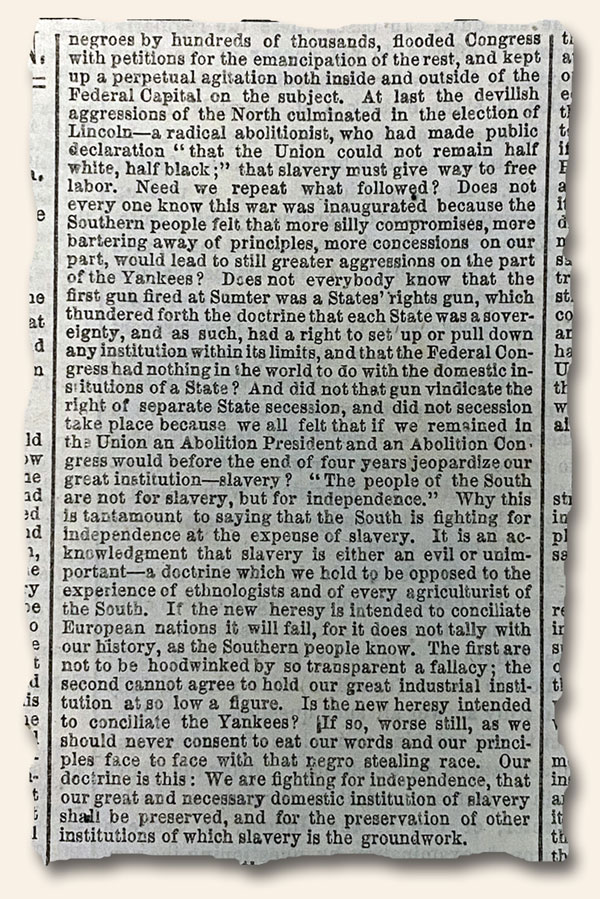Horace Greeley inadvertently meets a slave trader (1859)…
September 11, 2023 by GuyHeilenman · Leave a Comment
As Kansas began to bleed were slaveholders in Missouri and Kansas selling their slaves to other slaveholders in the South? Did the efforts of the well-intended inadvertently lead to opportunists who “helped” to rid the region of slaves by becoming slaver traders? The article shown below from The Norwalk Experiment (OH) dated June 14, 1859 appears to indicate as much. While the likelihood of the worst of humanity rearing its ugly head under such circumstances is certainly not hard to fathom, our efforts to find documentation of this happening at this particular time has come up dry. If anyone can shed light on whether or not this had become common practice, please respond. If relevant, we will post your comment. Thanks in advance. In the meantime, the complete article is shown below.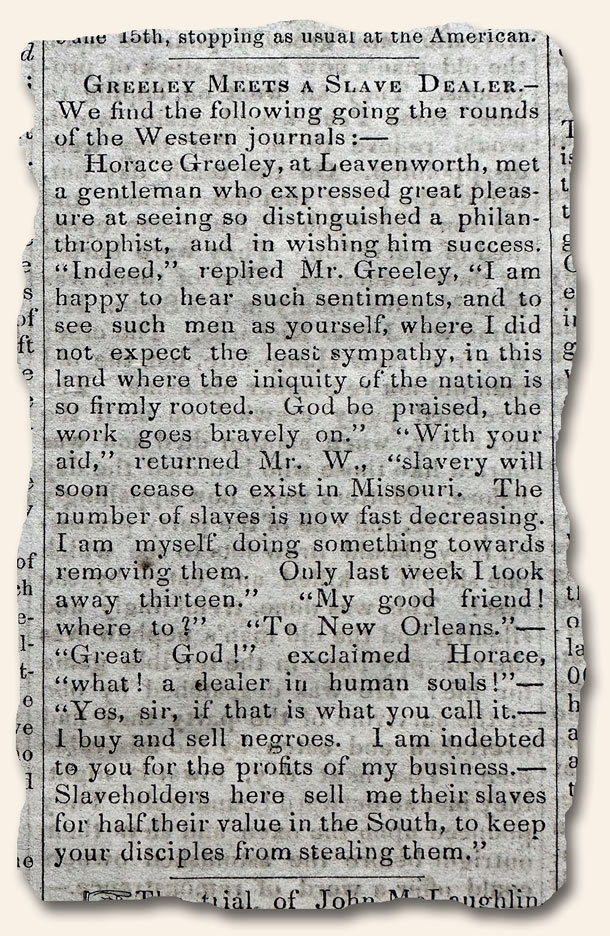
We all need a North Star… Wisdom from Frederick Douglass…
August 14, 2023 by Laura Heilenman · 1 Comment
It is difficult to look at the life of Frederick Douglass and not become completely enthralled. Over the years, as I have ventured beyond the surface-deep historical facts by reading his speeches and writing, I have been astounded by his insight into the human condition and his wisdom which inspires the reader to live their best, most sacrificial life. It is no coincidence his first newspaper was titled THE NORTH STAR (later called the FREDERICK DOUGLASS’ PAPER). I would submit we can all use a clear guide to true north. Here’s hoping and praying that every new generation studies his life and writings, thereby helping to ensure “a more perfect Union” and a brighter future for all.
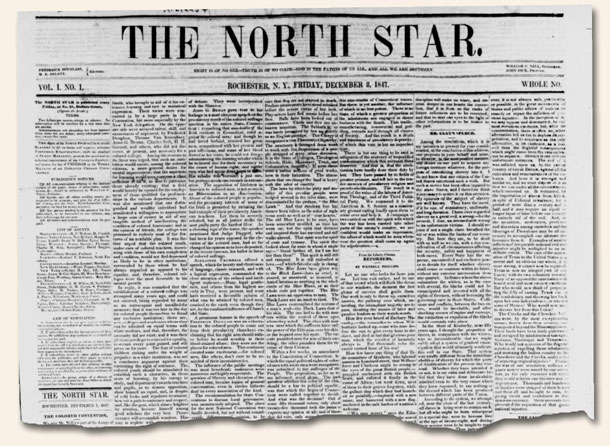
Source: Edited photo from the Library of Congress, Washington, DC
The impact of Newspapers on the abolition of slavery…
August 4, 2023 by GuyHeilenman · Leave a Comment
 The impact print media in general, and newspapers in particular had on attitudes towards slavery cannot be overstated. The abolitionist press was in full-force during the early-to-mid 1800’s with publications such as The Anti-Slavery Bugle, The Emancipator, the National Anti-Slavery Standard, the National Era (which had the honor of being the first to print Harriet Beecher Stowe’s “Uncle Tom’s Cabin”), among those who carried the torch. While some publishers became household names during this critical period in American history (William Lloyd Garrison – publisher of The Liberator), Frederick Douglass – publisher of the North Star [later, the Frederick Douglass’ Paper], and Horace Greeley – publisher of the New York Tribune), a slew of others, while highly influential, have largely been forgotten. One such unheralded publisher was Hezekiah Niles’, the publisher of the Niles’ Register from Baltimore, Maryland. While Niles’ Register would not be placed under the umbrella of The Abolitionist Press, not wearing this label coupled with its heavy focus on political issues may have played to his advantage when Hezekiah wrote and published his “Mitigation of Slavery” in serialized form over a span of 8 issues in 1819. It may not have had an Uncle-Tom’s-Cabin-level impact among the masses, there is little doubt the minds of many in-and-around Washington D.C. were challenged to keep the abolishment of slavery at the forefront of both political and public discourse. The full text of his essay can be read on-line, however, photo-snippets of portions of an original as well as a brief description may be viewed on the Rare Newspapers website: Hezekiah Niles’ “Mitigation of Slavery“. His final thoughts are shown below.
The impact print media in general, and newspapers in particular had on attitudes towards slavery cannot be overstated. The abolitionist press was in full-force during the early-to-mid 1800’s with publications such as The Anti-Slavery Bugle, The Emancipator, the National Anti-Slavery Standard, the National Era (which had the honor of being the first to print Harriet Beecher Stowe’s “Uncle Tom’s Cabin”), among those who carried the torch. While some publishers became household names during this critical period in American history (William Lloyd Garrison – publisher of The Liberator), Frederick Douglass – publisher of the North Star [later, the Frederick Douglass’ Paper], and Horace Greeley – publisher of the New York Tribune), a slew of others, while highly influential, have largely been forgotten. One such unheralded publisher was Hezekiah Niles’, the publisher of the Niles’ Register from Baltimore, Maryland. While Niles’ Register would not be placed under the umbrella of The Abolitionist Press, not wearing this label coupled with its heavy focus on political issues may have played to his advantage when Hezekiah wrote and published his “Mitigation of Slavery” in serialized form over a span of 8 issues in 1819. It may not have had an Uncle-Tom’s-Cabin-level impact among the masses, there is little doubt the minds of many in-and-around Washington D.C. were challenged to keep the abolishment of slavery at the forefront of both political and public discourse. The full text of his essay can be read on-line, however, photo-snippets of portions of an original as well as a brief description may be viewed on the Rare Newspapers website: Hezekiah Niles’ “Mitigation of Slavery“. His final thoughts are shown below.
Horrace Greeley, Fred Douglass, Harriet Beecher Stowe… Hezekiah Niles…
Time-Lapse… Frederick Douglass (1834) to Henry Garnett (1865)…
November 24, 2022 by GuyHeilenman · Leave a Comment
As I continue to slowly devour every word of the autobiography, “The Life and Times of Frederick Douglass”, I was recently moved to as close to tears as I come as I pondered his retelling of the crushing hopelessness he felt after having been beaten to a whisper of death:
“I have often, in the deep stillness of a summer’s Sabbath, stood all alone upon the banks of that noble [Chesapeake] bay, and traced, with saddened heart and tearful eye, the countless number of sails moving off to the mighty ocean. The sight of these always affected me powerfully. My thoughts would compel utterance; and there, with no audience but the Almighty, I would pour out my soul’s complaint in my rude way with an apostrophe to the moving multitude of ships.”

‘You are loosed from your moorings, and free. I am fast in my chains, and am a slave! You move merrily before the gentle gale, and I sadly before the bloody whip. You are freedom’s swift-winged angels, that fly around the world; I am confined in bonds of iron. O, that I were free! O, that I were on one of your gallant decks, and under your protecting wing! Alas! betwixt me and you the turbid waters roll. Go on, go on; O, that I could also go! Could I but swim! If I could fly! O, why was I born a man, of whom to make a brute! The glad ship is gone: she hides in the dim distance. I am left in the hell of unending slavery. O, God, save me! God, deliver me! Let me be free!–Is there any God? Why am I a slave? I will run away. I will not stand it. Get caught or get clear, I’ll try it. I had as well die with ague as with fever. I have only one life to lose. I had as well be killed running as die standing. Only think of it: one hundred miles north, and I am free! Try it? Yes! God helping me, I will. It cannot be that I shall live and die a slave. I will take to the water. This very bay shall yet bear me into freedom. The steamboats steer in a northeast course from North Point; I will do the same; and when I get to the head of the bay, I will turn my canoe adrift, and walk straight through Delaware into Pennsylvania. When I get there, I shall not be required to have a pass: I will travel there without being disturbed. Let but the first opportunity offer, and come what will, I am off. Meanwhile I will try to bear the yoke. I am not the only slave in the world. Why should I fret? I can bear as much as any of them. Besides I am but a boy yet, and all boys are bound out to someone. It may be that my misery in slavery will only increase my happiness when I get free. There is a better day coming.’
I shall never be able to narrate half the mental experience through which it was my lot to pass, during my stay at Covey’s. I was completely wrecked, changed, and bewildered; goaded almost to madness at one time, and at another reconciling myself to my wretched condition.”
All bound by the common thread of having been given the breath of life by the same Creator, how could one “brother” treat a fellow sojourner with such abject cruelty? This goes beyond black and white as the relationship between slave an owner has played out similarly since the dawn of time, however, will it never end? Would ”The Almighty” hear his cry?
Fastforward approximately 30 years. Frederick Douglass is now free, residing in the North, and is living a life of gratitude expressed by his exhaustive efforts for the cause of abolition. Slaves are on the cusp of being emancipated, and for the first time in the history of the United States, a former slave of African descent, Rev. Henry Garnett, was permitted to preach (a common occurrence for whites) at The Capital. The article below regarding this event was printed in the New York Tribune, dated February 13, 1865. There would still be many obstacles to overcome before former slaves (or their descendants) would be viewed as “equal under the law”, and some might (rightfully) argue additional progress still needs to be made, but in this moment in time, with the Frederick Douglass quote fixed firmly in my mind and weighing heavy on my heart, I am grateful for the hope provided by the gains which have been made through time.

Help needed to understand – Rev. J.W.C. Pennington’s correspondence…
November 21, 2022 by GuyHeilenman · Leave a Comment
While reading the autobiography “The Life and Times of Frederick Douglass” a few days ago, at one point Douglass mentions his marriage to Anna Murray being presided over by Rev. J. W. C. Pennington, a “highly respected” pastor who was himself a former slave. To go from being a slave to a free, admired, New York City pastor certainly perked my interest. As is typical in the world of Rare & Early Newspapers, I immediately dug in to see if any newspapers mentioned this “highly respected” pastor. Thanks to the online database of The New York Times, I found an article in the NYT for June 2, 1854, which provided an exchange of letters between the pastor and two others in regard to the purchase of a slave. To be honest, after reading through the correspondence multiple times, my lack of knowledge of such things is currently winning the day. Is this related to the underground railroad? Was the potential “purchase” of this slave a means of emancipating him? If so, was this common? Although I am (slightly) embarrassed to admit it, I do not understand this exchange – but do not want to remain uninformed. If anyone can enlighten me, please email me at guy@rarenewspapers.com. If appropriate for the History’s Newsstand Blog, with permission I would like to add anything which might be helpful to readers of this post. Thanks in advance. The article: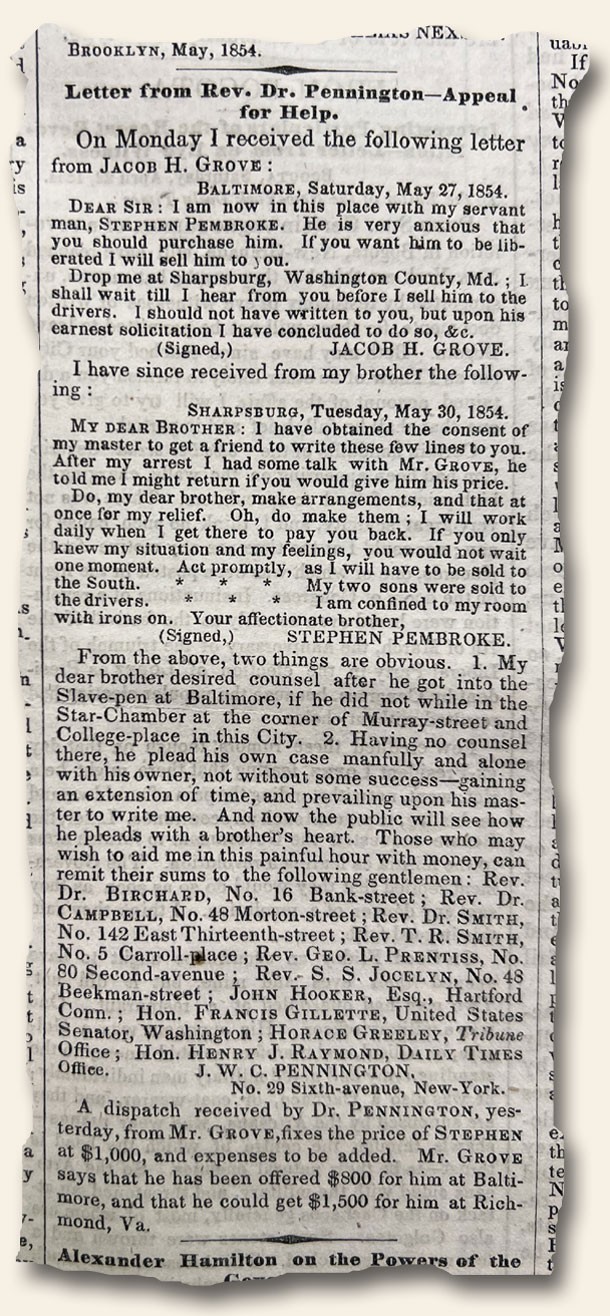
John Brown, 1859… What would you be willing to die for?
October 21, 2022 by GuyHeilenman · Leave a Comment
On November 2, 1859, John Brown was declared to be guilty of murder and treason. Before his sentencing was announced the court clerk asked him if he had any last words. Expecting the question (for it was required by law), he rose, and with full composure and clarity of voice he gave his last speech – the text of which appeared in many newspapers the following day. Upon searching our archives, we discovered one of these reports in a New York Tribune:
As I read the article, in addition to being reminded of the sacrifices made by so many in order to bring about the abolition of American slavery, I was challenged to consider if there was a cause for which I would (truly) be willing to die. It is one thing to sacrifice one’s life to save a loved one, but a “cause”? I pray my faith would rise to such a height (for it’s certainly worthy), but until the moment of truth is at hand…
So, I ask again: What is worthy of the ultimate sacrifice? Those who gave their lives in an effort to gain and/or preserve our freedom had their answer. John Brown had his. How about you and me?
PS If anyone can recommend a good book which provides an honest assessment of whether John Brown was a hero or a villain, please email me at guy@rarenewspapers.com. Please know I understand this may be a very complex analysis.
Juneteenth Revisited – “The rest of the story”…
June 27, 2022 by GuyHeilenman · Leave a Comment
 Roughly a week ago we were observing the most recent addition to our list of Federal Holidays: Juneteenth, which commemorates the day when Union troops marched into Galveston, Texas and Major General Gordon Granger informed the people of Texas that all enslaved people were now free. His General Order (No. 3) stated: “The people of Texas are informed that, in accordance with a proclamation from the Executive of the United States, all slaves are free…”. However, what is that at the end? Dot, dot, dot? There’s more?
Roughly a week ago we were observing the most recent addition to our list of Federal Holidays: Juneteenth, which commemorates the day when Union troops marched into Galveston, Texas and Major General Gordon Granger informed the people of Texas that all enslaved people were now free. His General Order (No. 3) stated: “The people of Texas are informed that, in accordance with a proclamation from the Executive of the United States, all slaves are free…”. However, what is that at the end? Dot, dot, dot? There’s more?
His full order reads as follows: “The people of Texas are informed that, in accordance with a proclamation from the Executive of the United States, all slaves are free. This involves an absolute equality of personal rights and rights of property between former masters and slaves, and the connection heretofore existing between them becomes that between employer and hired labor. The freedmen are advised to remain quietly at their present homes and work for wages. They are informed that they will not be allowed to collect at military posts and that they will not be supported in idleness either there or elsewhere.” In other words, “You are free, but if you think the government is going to support you if you leave your new ’employer’, think again.” For many, this would be analogous to someone who was bound, kidnapped, and being transported by airplane to some horrible location having their bindings removed and told they were welcome to leave any time they want (albeit, at 10,000 feet without a parachute). While this Order is quite historic, and the day does deserve to be celebrated, there is a whiff of Hotel California in the air: “You can check-out any time you like, but you can never leave!”
Am I exaggerating – misrepresenting the circumstances? One might think so, but an article I recently discovered within a July 16, 1865 issue of The New York Times which printed a follow-up Order by General Granger given approximately one week later begs to differ: 
Even when granted with good intentions, freedom needs to be embraced – and the “doing so” is often fraught with hardship. However, while the struggle continues, taking time to celebrate this momentous occasion (along with the many victories which have occurred since June 19, 1865) is worthy of our unified, citizen-wide efforts – regardless of our racial, social, political, religious or economic differences. The intrinsic hope of “We The People!” must ever be before us.
A woodcut masthead is worth a thousand words… Slavery…
May 16, 2022 by GuyHeilenman · Leave a Comment
A few weeks back my favorite person posted: Take a Closer Look … The Delicate Details of Woodcut Prints…
Such prints are truly amazing. However, as is the case with (most?) works of art, to some degree they tell a story. One such story is that of “Slavery – The Cry for Emancipation”, as told through the masthead of The Liberator. While we have many historic newspapers containing articles chronicling the path from the horrors of slavery, through emancipation, then on to suffrage and beyond, few rival what is communicated through this most-amazing, intricate, illustration which was present at the top of nearly every issue. At a distance its beauty speaks to the eyes, but a close-up view shouts to the heart: ENOUGH!
See for yourself:

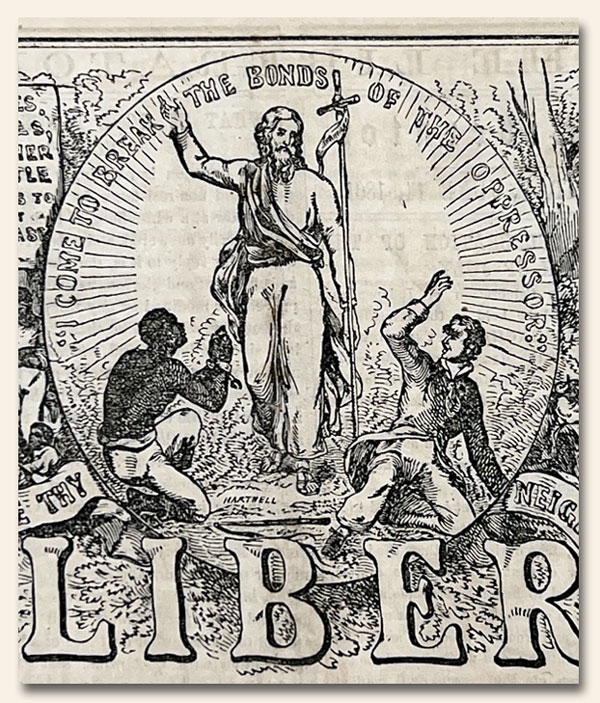
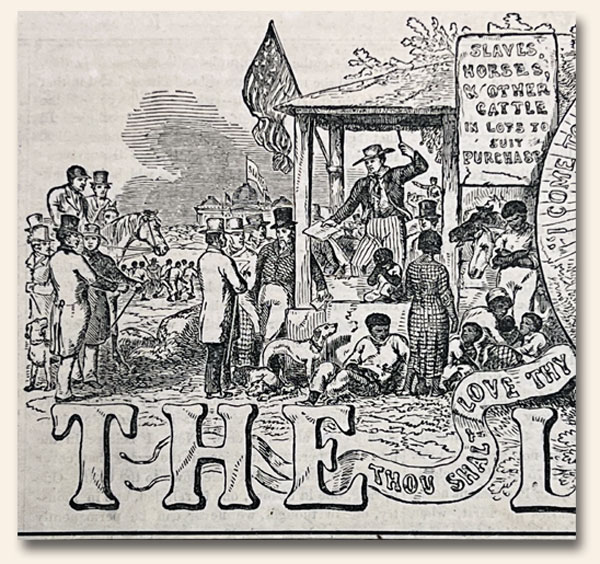
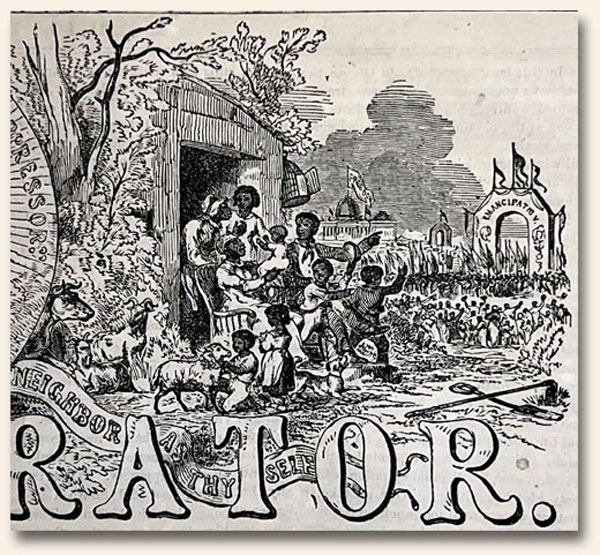
Snapshot 1879 – A former slave’s trek from bondage to bounty…
January 24, 2022 by Laura Heilenman · Leave a Comment
As I was reading interesting articles regarding Mormons, Frederick Douglass, and other news of the day in a January 19, 1879 issue of The New York Times, a somewhat nondescript heading caught my attention: “A COLORED MAN’S HISTORY”. Knowing (second-hand at best) a bit about the struggles of being Black during this post-Slavery era of American history, I was quite surprised by what I read. His trek was certainly not the norm, and it in no way negates the horrors experienced by far too many who had once been in bondage, however, I could not help but be inspired by the brief account of his life. Please enjoy.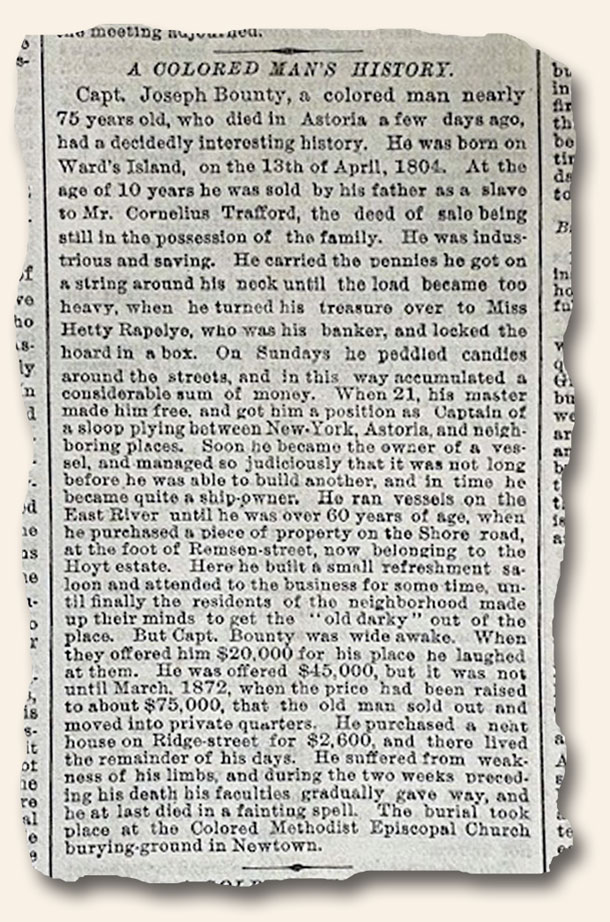
Snapshot 1864… Confederacy’s fight – for independence or slavery?
December 20, 2021 by GuyHeilenman · Leave a Comment
In grade school back in the 1960’s/1970’s I was taught that the Civil War was fought between the Northern (Yankee) States who wanted to free the slaves and the Southern States (Confederates) who wanted to keep the slaves in bondage. Bad Southerners! Perhaps if I had been born in The South my education would have been bent in a different direction, but through my teenage years I assumed this was the accepted “truth”. When I moved on to college… and then graduate school, my assumption of such a simplistic view was challenged by my enlightened (now I think they would be called “woke”) professors who informed me of the true reason: The Southern States merely wanted to exercise their right to self-government (i.e., “State’s Rights”)… to not be controlled by a federal government whose reigns were largely in the hands of the Northern States and their own interests… the right to separate (succeed)., while the Northern States wanted nothing more than to preserve The Union (largely for selfish reasons). Bad Northerners!
Of course I now know the reasons were varied and complex, but by far the most important result was in fact the Emancipation of enslaved blacks. After all, how could “We The People” possibly stand the test of time without embracing (to the core) the self-evident truth that “all [people] are created equal, that they are endowed, by their Creator, with certain unalienable Rights, that among these are Life, Liberty, and the pursuit of Happiness”?
However, I digress. Circling back to the divergent views I was taught…
As I was perusing a Sacramento Daily Union (Nov. 3, 1864), the heading of a front-page article caught my attention: “The New Agitation in the South – Slavery as Well as Separation the Ultimate Object of the Rebellion”. It turns out that while revising history to meet a specific narrative may be the order of the day, the historical perspective regarding this particle issue may not be a victim of these Orwellian efforts. The article (in full) is as follows:
